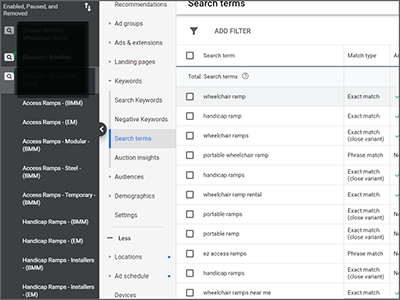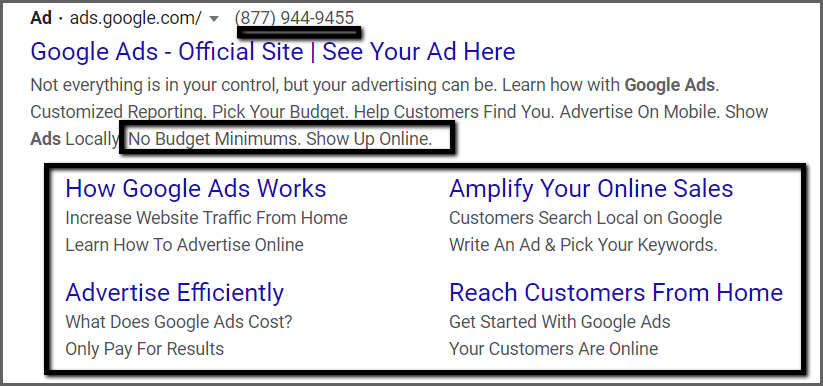Posted on 7/21/2020 in Digital Marketing
By Ryan MacQuarrie
Pay Per Click (PPC) account management is not easy to master. However, if used correctly, it can drive targeted buyers to your site and give you a steady flow of visitors. Since settings and options in digital marketing platforms are always evolving, it is important to stay current and know your options. Since you are paying for every click, we have actionable tips to help you be successful in optimizing and using every penny of your budget wisely.
Here are 7 PPC tips that make sense no matter what:
Eliminate Unwanted Clicks
One of the most important aspects of PPC campaign management is to make sure you are effectively using your budget. One of the easiest and most effective ways to do this is to use the search terms report to find negative keywords and eliminate unwanted clicks. When viewing the report you can see what search terms your potential customers are using to trigger your ads. You can then add negative keywords to prevent your ads from showing on certain search queries, which in turn will prevent wasted spend on irrelevant terms. The frequency of this action depends on the volume of traffic flowing through your campaigns. You may need to check the report once a month, once every other week or even once a week. However often you choose to review the report be sure to keep it consistent.

Use Ad Scheduling
Prevent showing your ads during times your potential customers don’t convert with ad scheduling. Ad scheduling is another handy way of controlling your budget. You can pick and choose which times of the day your ads will potentially show. For example, if you are a B2B company and only want to be contacted during business hours, it would make sense to only show your ads from 8-5 Monday through Friday. In most cases, it’s best to show your ads at all times (the default setting) and then use data to pare down your schedule. If you see trends of low performance at certain times of the day then you can either add negative bid adjustments or exclude those times from your ad schedule all together.
Make Your Ads More Relevant
Dynamic keyword insertion is a great way to make your ads more relevant to searchers. This tool allows you to get the keyword that a user searched for into your headline without having to create hundreds of versions of ad copy. For example, if you sell wheelchair ramps and want your first headline to be filled with the search keyword then you’ll want to enter {KeyWord:Wheelchair Ramps}. This will fill the headline with the keyword that the searcher triggered your ad with as long as it’s under the 30 character limit. If it goes over the character limit then the headline will display what is after the colon, in this case, Wheelchair Ramps. Keyword insertion is a great way to get a bold keyword into your headline on the search results.

Use Google’s Prebuilt Audiences
Try adding Google’s prebuilt audiences to your search campaigns for additional optimization. Google uses its extensive data sets to build out tons of audiences of specific groups of people. You can add those audiences to your search campaigns for an extra layer of targeting. For example, if you are marketing luxury vacation rental properties you can add Google’s affinity audience of Luxury Travelers and put a positive bid adjustment on it. Whatever you are selling, chances are that there is a prebuilt audience that you can utilize. You can even add them to campaigns with no-bid adjustments first just to see how certain groupings perform.
Maximize Your Ad Real Estate
The more space your ad takes up on the SERP (Search Engine Results Page) the less space your competitors have available to them. Use as many ad extensions as possible to maximize your ad real estate on the search results page. Sitelinks, callouts, call extensions, location extensions, structured snippets and more. Try incorporating any and every extension that works for your campaign.

Leverage Landing Pages
When working with PPC campaigns you want to leverage specific landing pages for better lead quality and conversion rates. Paid landing pages should be specific to the services you are selling and should be designed to allow your users to convert and leave. You want to have a form that has the fewest number fields possible and it should be above the fold. There should also be clear calls-to-action throughout the page.
Implement Long Tailed Keywords
Try to use longer tailed exact match keywords whenever possible to improve performance. Exact match versions of longer tailed keywords will typically have higher CTRs and conversion rates. They describe your products and services in greater detail, so anyone searching for them is much more likely to convert. You still need the broader keywords in your account to capture traffic, but whenever possible long-tailed keywords are encouraged.
Setup Conversion Tracking
Conversion tracking is probably the most important aspect of any PPC account. You want to make sure you get it set up properly. All optimizations you make in your account should be geared towards getting as many conversions as possible. Setup conversion tracking in Google Analytics and then import into Google Ads for the best results.
Getting the most out of your PPC campaigns means using some or all of these strategies to maximize your advertising impact. You’ll be well on your way to that steady flow of visitors. If you need assistance in managing your strategy and campaigns contact Wakefly and speak to our experts today.
Struggling to get more visitors to your site?
Request a Free SEO Audit of Your Website!Related Articles

Elevating Your Brand: The Transformative Power of Website Design
In the digital age, your website is often the first point of contact between your brand and potential customers. It's not just a platform to showcase [...]

Navigating the Effects of SEO Algorithm Adjustments in 2024 on Your Website's Rankings
In the fast-paced world of digital marketing, staying ahead of algorithm updates is crucial for maintaining a competitive edge. As we step into 2024, [...]

Rethinking Digital Strategies: Marketing in the Post-Third-Party Cookie Landscape
In the ever-evolving realm of digital marketing, the impending demise of third-party cookies poses a significant challenge for businesses worldwide. [...]

